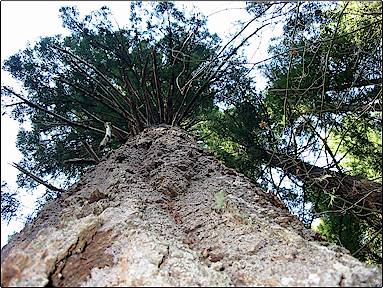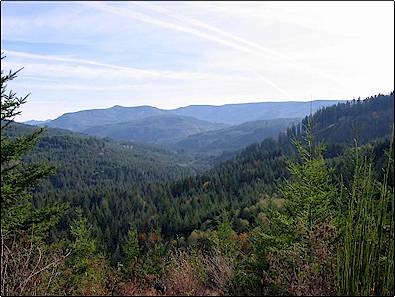
Pat Patteson
|
Molalla
River Watch |
Ahoy
by Guest Columnist Pat Patteson
RISING FROM THE
ASHES:
Doug Fir Is great for boat building. Light and relatively water resistant, but unfortunately, vertical grain old growth Doug Fir is more expensive today than Red or White Oak.
The Reason for that is simple. Not to get too political, but, part of the "Spotted Owl vs.
Hard Working Loggers" argument that gets left out, is that there just aren't many 400 year old Douglas Fir trees left. Estimates are 210% of what once was. Nearly all the big trees are gone. Many people who come to Oregon don't even notice. There are still lots of big trees, but if you
have never seen a "True Old Growth Forest", you literally don't know what is missing.
Weyerhouser, "Georgia" Pacific, "Louisiana" Pacific, Crown Z, and the Power Pole company that moved our family to Oregon in 1952, when I was 3, did not send all their people out to Oregon because it is a nice place to raise a family. It is, but they all came here because there were "Endless Forests" of 400+-year-old Douglas Fir trees. Most of those companies came from where they had already cut most of the "Endless Forest" somewhere else.
The pole plant my Dad ran closed in 1975, because most of the 150 foot old growth poles were gone, or too expensive to exploit. Many of the timber companies try to blame the "Spotted Owl" and "Environmentalist Tree huggers", for the demise of the timber industry" in Oregon, and the loss of thousands of jobs. Sometimes, they call those who try to protect the few remaining
habitats, "Ecoterrorists". (That should "Sell" even better now.) There are still a few, mostly young, longhaired types, (like I was, when I had hair), who put their lives on the line to try to "save" the few habitats left. They have been pretty much "marginalized", and the cutting continues to this day, as the Corporations continue to cut the last of the last.

The last of the last. Looking
Up A Big Fir. (About 5' diameter)
The Federal Government has lost, and continues to lose, millions of dollars every year in it's "timber sales" of the "last of the
last" on Federal lands. "Federal" does not mean "protected". In fact it has actually always been the other way around. The Federal Government has always had,
as it's number one objective, to "Get the Cut Out".
The prices for the remaining old growth have skyrocketed, and, although not as high as they were a few years ago, still make it very profitable for the big companies to try to get every tree they can. A single old growth tree (a really big one) can be worth several thousand dollars.
Along with the Old Growth, much of the Habitat has also been destroyed. Western Oregon is truly a "Rain Forest", (I have ferns on my place that are taller than I am), but most of that too, is gone.
Some of the timber companies have "replanted" the areas, but those trees have proved to be not nearly the quality of the originals. They were developed to be fast growing, but many are disease
prone, and must be cut after as little as 5060 years. The quality of the lumber from a tree farm does not come close to the 400 year old trees. Douglas fir marine grade plywood has gone from very good to crap.
This "Timber Issue" Is a lot more complicated than a lot of people realize. The whole thing has been oversimplified to make it easier to take sides or to make 10 second sound bites.
On the one hand, it is a "War" of hardworking, patriotic, family loggers, who are only trying to provide for their families, and provide lumber for housing. They battle against young, dirty, long haired, radicals, who have never worked a day in their lives, with the goal of stopping all logging and putting loggers out of work.
I know which side I would be on. No brainer.
On the other hand it is a “War” between "intelligent, thoughtful, concerned people, who are trying to protect our forests and the environment and uncaring, greedy, ignorant loggers, whose only concern is to cut the last tree of the forest in order to make a fast buck."
Again, no brainer.
In any debate, (or war), the most important tactic is to control the terms and the definitions. Who has defined this debate?
Another way of looking at this whole issue, one that usually gets lost in the anger of the "war", is the old tactic of divide and conquer. For most, it has been a personal war. They have been drawn into an emotional battle, and are sometimes literally fighting for their lives or livelihoods.
Take one giant step back, out of the fray. Who has benefited from all this division, fear, anger, violence and hate? Not the family logger or the concerned environmentalist. Both have given their all, but both have lost. While the loggers and environmentalists have been fighting each other, the family wage timber jobs have been lost, and much of the remaining old growth forest has been lost. Corporate Timber Companies have profited.

Pat Pateson meadow rowing
in his Rapid Robert drift boat.
Look closely and you will see he is wearing a 2001 Depoe Bay
Wooden Boat Festival and Crab Feed T-Shirt.
I live a cabin the woods near Molalla, and grew up in Albany, home of the "World Championship Timber Carnival". Albany has grown to be more than just a timber town. There were a lot of reasons. One was the unexpected result of the 1960 fire that destroyed the biggest plywood mill in town. The mill was not rebuilt. The times had already changed and Albany was forced to change with them. Albany rose from the ashes, but with options. Albany didn't have to go through the anguish many other small Oregon towns have. It was already working on a way out.
Molalla, on the other hand, is still going through "The Timber War". (You can still find "Fried Spotted Owl" signs in the local eateries.) Molalla has yet to determine it's way out.
I've lived in the Molalla area for about 30 years. (I'm a "new comer") Although I am a woodworker, I was never really part of the "Timber Town” culture. (I do not use that in a derogatory way.) I do thin my property, and sell the logs to the local mills. It is all third growth, and mostly, disease prone, fast growing trees. In many ways, the “Timber Town” culture is the spirit of America. There are a lot of great people, many of them my friends, who are generational timber people. Most have all the attributes that make for a real community.
Working in the woods, although very dangerous, hard work, is great.
On the other hand, I see that same culture as having been very damaging to Molalla and other timber dependent communities in Oregon. With the economy of Molalla nearly totally dependent on timber, it has always been at the mercy of the housing market. Even when there was a lot of timber to cut, much of the town would be unemployed if there was a slump. Many were laid off work for several weeks or months during a wet or cold winter, and were limited during fire season in late summer. The economy was always on the brink of disaster, and many people were always just a paycheck away from real trouble. Some, unemployed, frightened, desperate workers spent a lot of time in taverns. (I think taverns were the number two economy in Molalla.)
Many of those same good families suffered. (Again, not placing blame, but stating fact, timber towns in Oregon have some of the highest domestic violence rates in the a country. Life on the edge is not easy. Many of those same people see the "Spotted Owl" as Another frightening assault on their lives.
Unfortunately, one of the other bad things about the timber culture is that a formal, book learning, education has not been a priority, or even a concern for many. Many teenage boys assumed that they would get a job at the mill, or in the woods. The girls thought they could just marry someone and raise a family. They though that while an education might be OK, it was not a necessity. With very little education or diversity, they are now faced with the necessity of finding another good job. Difficult, even with a good education. Many of the young people must now leave Molalla to find employment. The “Community” is dying.
One of the things I believe did help Molalla, again in an unexpected way, was the abandonment by Crown Z. Crown was the only real corporate operation" in Molalla. The others were
relatively small, locally owned companies. Crown had thousands of acres of what, once, was old growth timber lands.
While they did vie for a lot of the Federal timber, they had the luxury of their own timber, unlike the Local Mills, which were almost totally dependant on Federal timber. Much of the timber Crown Z owned only passed through Molalla. They did employ many for logging and truck driving, but the actual logs went right through Molalla on their way to Canby, where whey were dumped in the Willamette for the short trip to be chipped at the Crown Z paper mill
in Oregon City or shipped to their other mills.
They built a special private logging road that ran from the headwaters of the Molalla, all the way to Canby. There were no burdensome regulations on their truck trains, with huge, 10' wide bunk, triple trailer trucks, and no load limit. They even went to the expense of installing traffic lights at all the intersections with the County Roads; lights that were electronically controlled to change to green for the trucks as they approached, so they didn't have to stop, or even slow down, all the way from Molalla, to Canby. (Molalla is Still Waiting for It's first real, Red, Yellow, Green, Stoplight.)
Crown took it All, and they took it fast. When they saw that the cream was nearly all gone, they did what corporations do, they left. Crown sold their lands to Cavenham Forest Industries, a holding company, owned by a smart British billionaire. Cavenham followed Crown around, buying all their properties as they left. Crown just wanted out. They had made their money. They had cut. It was time to run.
Cavenham was able to buy most of Crown's holdings, and sell off the mills and machinery, and get all the timber lands for essentially nothing. Unfortunately, Cavenham was not the good Neighbor Crown had been, and closed all the former Crown lands to the public. RentaCops on constant patrol, even helicopters patrolling at times. A lot of the local folks had used the lands for recreation all their lives, and all of a sudden, they had no place to go hunting. Cavenham really didn't care. We got a small taste of what it must be like to be treated as peasants. Now, with no locals disturbing the land, there were abundant deer and elk herds. Cavenham brought in executives and other cronies on safari to hunt.
Crown did have a lumber mill in Molalla, and when Crown left, Cavenham did not want the problem of operating a sawmill, so they closed it. This time, those mill workers were not just laid off, they were done. The mill sat idle for some time, until Cavenham found a buyer.
RSG Forest Products bought the mill, and invited the unemployed workers back. Unfortunately the former workers were to be paid only about half of what they had previously earned.
Some of the folks in Molalla finally got the message. The Corporate Timber Companies were not benevolent employers, but corporations that would exploit their workers to make more profit.
RSG said that they were forced to pay lower wages to reopen the mill. The workers may have not been educated, but they were not stupid. They knew the mill had been profitable before, and that lower worker wages would not be the determining factor of whether the mill would make a profit, only How Much profit. Unfortunately, that knowledge did them little good, as they were out of work, and desperate for any work, at any wage. That mill is still running, but I don't think the workers are as mistakenly "Loyal" as they were to Crown, or as naive.
Willamette Industries bought the timber land from Cavenham, and have been doing a fairly good job of not exploiting it. Being a relatively local company, I believe they are actually taking a long term view of the forests, and are not just in it to make a quick buck. Unfortunately, Weyerhouser having seen Willamette make a profit, has been trying a hostile takeover of Willamette. That attempt seems to be on hold right now, as Weyerhouser now can't come up with the cash because of the latest downturn in the Stock Market. (Stay tuned.)

The Molalla River valley
looking South East. The picture was taken from the Aquila Vista,
educational sight that is Mile Post 8 on the Molalla Corridor Road
Some folks in Molalla, unfortunately, are still waiting for this downturn to be over, and for the return to "The Good Old Days". They are few, and I do feel for them. Now , maybe, we can get on with business. The big trees and the big companies are both gone. The big trees, maybe forever. The big companies, on to the next "endless forest" in other desperate third world counties".
Most folks now realize the real causes of their problems, and some have found other ways of getting on with their lives. Some of the local mills have invested in new tooling and are attempting to find new markets for specialized products. Some of the old machinery could only cut big logs. They are able to survive buying local, private timber. Not old growth, but second and third growth. They no longer have to compete with the deep pockets of corporate timber operators who would often outbid them on local sales in order to drive them out of business.
Small wood lot owners (like me) can now make a fair profit selling our trees to those mills.
We no longer have to compete with the Federally subsidized or corporate private timber that has, for so long, been sold below real market value.
Molalla too, is “Rising from the ashes.”
They don't call them timber barons for nothing. It's taken a long time for us to realize that we have all been just their serfs. Maybe they will finally leave us in peace.
Pat Patteson
Molalla, Oregon |
![]()